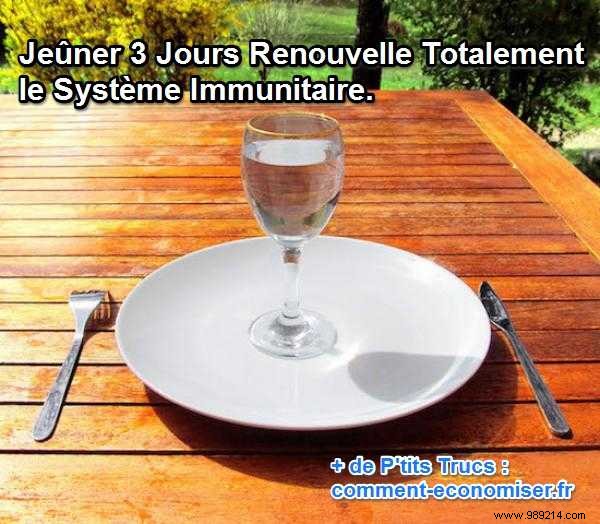
What if we could inspire the human body to regenerate and become more strong and resilient?
According to a team of researchers from the University of Southern California, it is quite possible.
This new scientific study establishes that with 72 hours of fasting, the immune system could rebuild itself as a whole.
The effects would be beneficial in healthy adults, the elderly or even sick people.
According to the conclusions of these scientists, fasting for 3 days totally renews the immune system.
Here are the explanations. Watch:

According to the researchers, this discovery is absolutely momentous.
On the other hand, nutritionists believe that fasting is harmful to the body.
But for researchers, abstaining from food for 3 days has benefits.
This forces the bone marrow to develop more blood cells that can fight infections.
The potential of this discovery is particularly interesting for patients whose immune system is failing.
One can think for example of people with cancer undergoing chemotherapy.
According to researchers at the American University, fasting initiates a process of regeneration.
"This gives the green light to the bone marrow to rebuild the whole immune system".
This is explained by Valter Longo, professor of gerontology and biology at the University of Southern California.
"And the good news is that the body gets rid of damaged or old and inefficient parts of the immune system during the fast.
And if you start from a system badly damaged by chemotherapy or aging...
Fasting cycles can create, quite literally, a new immune system."
During prolonged fasting, a significant portion of white blood cells, glucose and fat is eaten by the body.
Deprived of food, the body reacts by reducing its energy consumption.
It will draw on reserves of cells that are not essential, such as those that are aging or damaged.
The number of white blood cells drops during fasting to increase sharply as soon as you resume a normal diet.
At the same time, the PKA enzyme is less and less present in the body.
And that's good! Indeed, this enzyme is involved in aging and promotes the risk of cancer and the development of tumors.
"There is no evidence that fasting is harmful, but there is strong evidence that it is beneficial ", concludes Valter Longo.
Fasting is not risk-free.
It is essential to be well informed and documented before considering a fast.
It is important to talk about it beforehand with competent people (doctor, etc.).
Because fasting is not suitable for everyone:especially pregnant or breastfeeding women, children, the elderly, or people with eating disorders...
On the other hand, certain pathologies are not compatible with fasting (cancer, diabetes, heart disease, etc.).
Note that a fast should not be undertaken without medical supervision.
You should always be accompanied by a professional, whether it is with a healthy person and a fortiori in a sick person.
Are you used to fasting? Let us know in the comments if it works for you. We can't wait to read you!